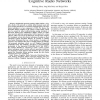Free Online Productivity Tools
i2Speak
i2Symbol
i2OCR
iTex2Img
iWeb2Print
iWeb2Shot
i2Type
iPdf2Split
iPdf2Merge
i2Bopomofo
i2Arabic
i2Style
i2Image
i2PDF
iLatex2Rtf
Sci2ools
INFOCOM
2008
IEEE
2008
IEEE
Robust Distributed Spectrum Sensing in Cognitive Radio Networks
Abstract—Distributed spectrum sensing (DSS) enables a Cognitive Radio (CR) network to reliably detect licensed users and avoid causing interference to licensed communications. The data fusion technique is a key component of DSS. We discuss the Byzantine failure problem in the context of data fusion, which may be caused by either malfunctioning sensing terminals or Spectrum Sensing Data Falsification (SSDF) attacks. In either case, incorrect spectrum sensing data will be reported to a data collector which can lead to the distortion of data fusion outputs. We investigate various data fusion techniques, focusing on their robustness against Byzantine failures. In contrast to existing data fusion techniques that use a fixed number of samples, we propose a new technique that uses a variable number of samples. The proposed technique, which we call Weighted Sequential Probability Ratio Test (WSPRT), introduces a reputation-based mechanism to the Sequential Probability Ratio Test (SPRT). We...
Related Content
| Added | 31 May 2010 |
| Updated | 31 May 2010 |
| Type | Conference |
| Year | 2008 |
| Where | INFOCOM |
| Authors | Ruiliang Chen, Jung Min Park, Kaigui Bian |
Comments (0)

